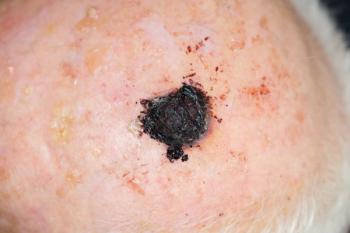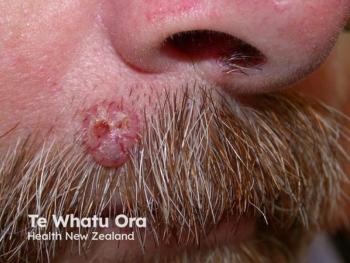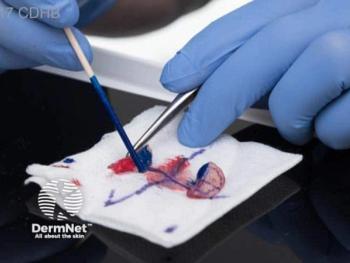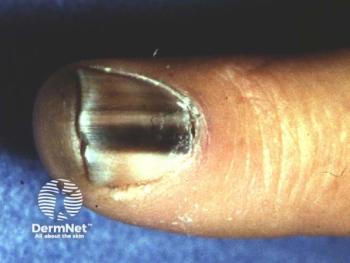
Sun Bus Helps Bust Melanoma Misconceptions, Provide Screenings
Mobile screening and education initiatives can help bridge gaps in both patient knowledge and access to care.
Run by the Colorado Melanoma Foundation (CMF), the Sun Bus has provided more than 3500 free skin-cancer screenings throughout the Central and Southwestern United States to date. Along the way, providers are learning perhaps as much about melanoma misconceptions as the project teaches patients about skin cancer.
“There are people out there who believe that sunscreen gives them cancer,” said Neil Box, MD, CMF president and a volunteer faculty member at University of Colorado.
“There’s a lot of misunderstanding,” he said, “and the idea that ‘it’s just skin cancer; it’s not harmful.’”
Speaking with patients on the 40-foot bus allows volunteers to bust myths in real time, added Tamara Terzian, PhD. “For example, in Colorado we have seen the belief that marijuana can cure melanoma. That’s something we can respond to and correct right there.” She is executive director of the Sun Bus and assistant professor of dermatology at the University of Colorado’s Anschutz Medical Campus in Aurora, Colorado.
The CMF bought the bus in 2018 and put it on the road in 2019, performing approximately 850 screenings that summer. “Then the pandemic happened,” said Box, “and that put everybody back on their heels. We came out of the pandemic with an expanded vision.”
For 2021, the CMF entered a partnership with Epiphany Dermatology, which operates 67 clinics in the Central United States. “We decided to work with some of their physicians to deliver free skin-cancer screening in many of the states that they operate in. We went on a tour of Texas, Colorado, New Mexico, and Arizona and gave away 2142 free skin-cancer screenings,” he said.
At press time, the bus had revisited Texas (performing more than 500 screenings there) and was about to embark for Georgia as part of a plan to visit 9 states this summer and fall.
If a clinician spots a concerning lesion, Sun Bus staff can help the patient get a timely follow-up appointment at a local clinic—sometimes in a matter of days, Box added. By the end of 2021, volunteers had referred 757 patients for follow-up of suspicious lesions.
The CMF welcomes help from other local dermatology clinics as well, Terzian added. “If they’ll work with us, and we can fit them into our schedule, we’ll try to work with anyone, including PAs and nurses. We’re open to any clinics partnering and collaborating with us for this mission.”
In response to concerns about potential overdiagnosis of melanoma,1 Box said that the CMF is examining the issue. “There are some people saying we should be doing less screening. I don’t think the answer is to do less screening in the community. The answer is to be looking at ways that we can refine how we target people to make the screening more accurate, so that we can better identify the bad lesions that are going to go on to be melanoma.”
Since 2019, Sun Bus volunteers have identified 51 lesions suspicious for melanoma, including 2 so far this year. “Any time we save one life,” Terzian said, “it already has a huge impact on the family, the community, and the neighborhood they’re living in.” With the annual cost of treating new melanomas expected to triple to around $1.6 billion by 2030,2 she said, prevention and early diagnosis can reduce this figure.
With melanoma far from cured, added Box, it’s premature to consider drastically changing the bus’s mission. “This is an area where we need more research. We have some very good drugs that have improved survival rates. But many people fail immune checkpoint inhibitors. So, the issue of prevention and screening is still on the table for this disease.”
Moreover, he said, the bus reaches out to people who do not have regular dermatology care, while also promoting broader community access. These efforts have enabled volunteers to identify noncancerous lesions and other skin diseases requiring treatment.
“When you make the opportunity for a free dermatology screening available to the public,” he said, “those that have concerns about their skin seek you out. Some of them even travel a very long distance to participate because they are worried.”
The bus is about more than screening, Terzian added. “We also educate about sun safety—what you can do to prevent skin aging and damage.” Additionally, the project teaches about cancer in general. And it recruits students, from undergraduates to residents and fellows, to help with its activities.
Other organizations offering mobile skin-cancer screenings include the following:
- The Skin Cancer Foundation (New York)—Destination Healthy Skin
- Moffitt Cancer Center (Tampa, Florida)—The Mole Patrol
- The Polka Dot Mama Melanoma Foundation (Cary, North Carolina)
“I encourage people to get involved and support these kinds of activities, wherever they are,” said Box. “As we grapple with skin cancer and melanoma, integrating mobile units into sun-safety and screening campaigns is going to be increasingly important.”
When politicians hit the campaign trail, they take a bus for a reason. “We’re out there campaigning as well,” he said, “but for health, access, skin care, and sun safety. We need to reach a lot of people to make an impact, and that’s what mobile unit can do.”
Disclosures:
Terzian and Box report no relevant financial interests.
References:
1. Adamson AS, Suarez EA, Welch HG. Estimating overdiagnosis of melanoma using trends among Black and White patients in the US. JAMA Dermatol. 2022;158(4):426-431. doi:10.1001/jamadermatol.2022.0139
2. US Centers for Disease Control and Prevention. Vital Signs. https://www.cdc.gov/vitalsigns/melanoma/. Reviewed June 2, 2015. Accessed May 17, 2022.
Newsletter
Like what you’re reading? Subscribe to Dermatology Times for weekly updates on therapies, innovations, and real-world practice tips.


















